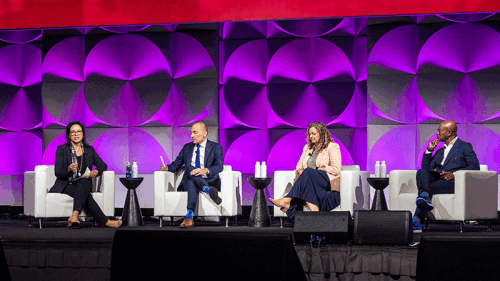When ULI Trustee Leonard Forkas, founder of Virginia-based wireless infrastructure firm Milestone Communications, bikes across the country in June, he will not be simply undertaking an outdoor adventure. Instead, by participating in the grueling, 3,000-mile 31st Annual Race Across America, which was set for June 13 to 25, Forkas would be dedicating himself to raising awareness for children fighting cancer.
In 2003, inspired by his son Matthew’s successful battle against leukemia, Forkas started HopeCam, a charity that uses teleconference technology to connect children who have cancer and other illnesses to their friends and classmates when they are too sick to attend school. Allowing the children to stay in touch with friends preserves for them some degree of normalcy as they are able to interact and socialize with their peers. Today, according to the hopecam.org website, more than 250 children in over 19 states and three countries have been able to use the service.
Related: Len Forkas, ULI Washington’s Past Chair, launched his book What Spins the Wheel
It is with the goal of increasing these numbers that he decided to participate in the race, says Forkas, who began biking as a means of coping with the stress of his son’s illness. “The way that we’re going to increase our scale is by spreading our message to a broader audience,” he says. HopeCam’s model lends itself to expansion and scalability because the children do not need to be located in the same area as the charity providing the service, Forkas says. The necessary telecommunications equipment can be shipped from a distance, and assessments can be conducted and connections between schools and children can be made remotely, and troubleshooting can be handled from afar as well.
Bringing wider national visibility to HopeCam will also help the charity obtain sponsorships that will enable expansion, he says. “By going crosscountry, we’ll have greater media attention to our cause.”
The Race Across America covers about 30 percent more distance than the Tour de France, and in about half the time. Forkas planned to cover 250 miles per day, allowing only four hours each night for sleep.
Forkas noted that factors like weather—including conditions during a300-mile stretch through the Mojave Desert— mechanical difficulties, and health issues ranging from nerve damage to severe neck issues, can plague a competitor in this type of endurance event. He has recruited a wide-ranging support team which includes a coach, paramedic, massage therapist, nutritionist, bike mechanic, and others.
To physically prepare for the race, Forkas has pre-ridden parts of the course, segments at a time, including the nearly 800 miles between Sullivan, Indiana to Annapolis, Maryland, which he completed in three days. He has also undergone metabolic testing at a sports medicine facility in Boulder, Colorado and had his Trek Madone bike optimally configured for the race. “I think I’ll have a good chance at being successful,” Forkas said, “if I work on all these things and reduce the risk of failure by being thoughtful.”
Others emphasized the difficulty of the race and the considerable physical strain it demands. When Forkas discussed the race and HopeCam at the ULISpring Meeting in Charlotte, another ULI Trustee and cyclist, John Bucksbaum, noted the high level of commitment inherent in Forkas’s decision to compete.
“He’s not giving himself credit for what he’s embarking on. People have died doing this. It’s very dangerous,” Bucksbaum said. “This is really the ultimate test that he’s about to undertake. This is something that goes beyond hard.”
In the end, though, Forkas said, the physical demands of the race are far outweighed by the children’s experiences with cancer. Both have some similarities, he noted, such as an end goal, participation by medical teams, and high quantities of the unknown. “a kid who has cancer goes through a similar journey,” Forkas said, but he pointed out one key difference between that child’s journey and his: he can quit.

